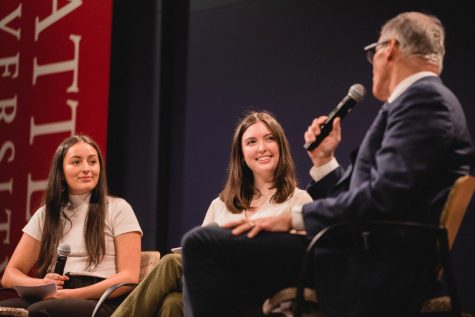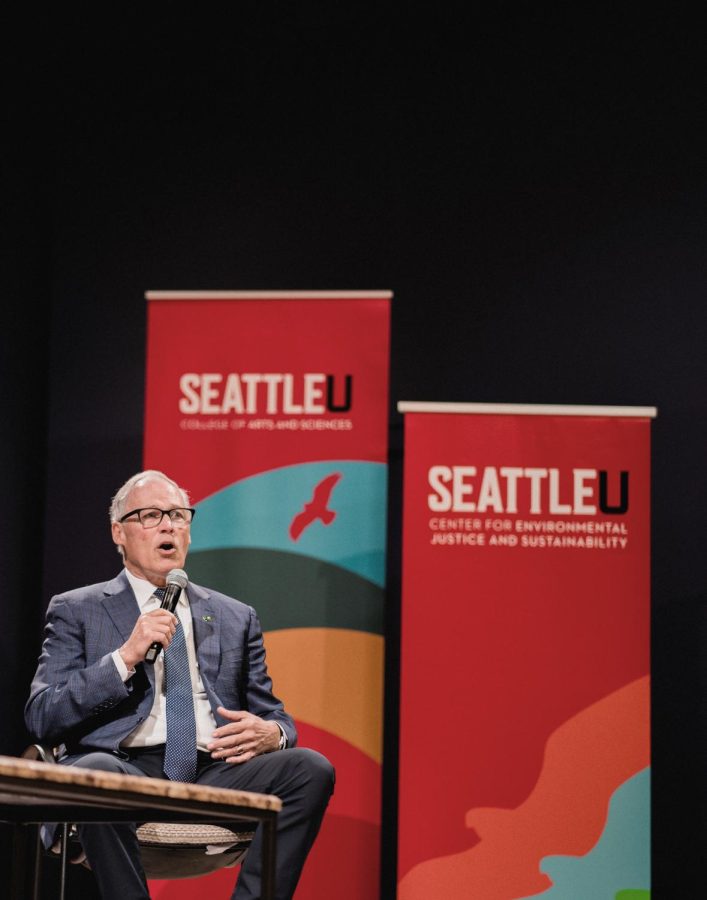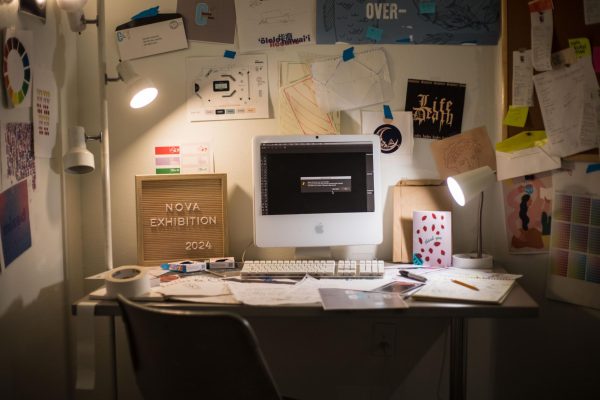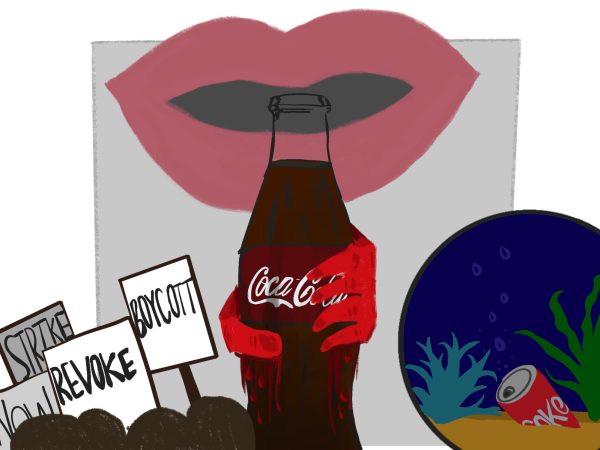Seattle U’s Earth Month Promotes Laudato Si’ Sustainability Goals
Washington State Governor Jay Inslee.
The month of April brings celebrations, activism and conversation surrounding the environment and climate change at Seattle University. Throughout the month, various clubs, organizations and departments across campus host events in honor of Earth Month.
To kick off, Redhawk Dining began serving climate-friendly dining options across campus. Beyond their month-long servings at Cherry Street Market, Chartwells implemented climate labeling this academic year. The labels serve to demonstrate the environmental and social impact of the food product to consumers. Menus are reviewed and given a status based on various sustainability standards including greenhouse gas emissions, labor conditions, land and water usage and soil biodiversity.
Various events across campus continue throughout April, highlighted by the Institute of Public Service and the Center for Environmental Justice and Sustainability’s (CEJS) April 14 conversation with Governor Jay Inslee. Fourth-year students Gaby Batinich, environmental studies and Spanish double major, and Anna Smalley, public affairs and economics double major, sat alongside Professors Larry Hubbell and Joni Balter where they asked Inslee climate policy and sustainability-related questions.
Batinich and Smalley were designated student representatives of Seattle U. They took student suggestions for questions and brainstormed a list of their own to ask Inslee. Due to time constraints, the two had to narrow down their list to 10 questions.
“We spent a lot of time trying to piece together what we wanted to say and what we wanted to ask him. We thought of every single question we could possibly ask him, and then we worked with Larry and Joni to narrow down the wording of the questions to be more precise,” Smalley said.
The two questioned Inslee on generational differences regarding climate change as well as insight into his stance on climate policy and climate education. The student representatives found themselves having the ability to ask different questions of Inslee with more ease than the professors alongside them.
“We tried to think of what type of stuff he would have knowledge on that we could benefit from,” Batinich said. “We were able to meet his staff too. He had a climate policy analyst with him, and she was really supportive of Anna and I.”
While the Q&A-style event focused on policy and sustainability, Batinich and Smalley valued Inslee’s responses as he advised them on post-college life. They found that their position as students allowed them to garner information unrelated to the environment that was applicable to audience members as well.
“It was really cool for us to be involved because we were taking that student perspective, and it made it more worthwhile for people to be there,” Smalley said. “We asked about advice for graduating students that want to work on policy, and I think that’s something he never would’ve answered if he wasn’t talking to students. He emphasized that every field needs people that care about the environment.”
Despite only interacting with Inslee for a short time, Batinich and Smalley were grateful for the opportunity to hear directly from the governor and participate in a large-scale event. Smalley noted that she found that type of participation useful as a skill in future careers. Both student interviewers encourage others to participate in Earth Month events to further climate education.
Earth Month events continue this week with the annual Earth Talks taking place Friday, April 21. This year’s theme is Care for Our Common Home, featuring Keynote Speaker and Seattle U alum Patience Malaba.
The theme of this year’s Earth Talks ties into Seattle U President Eduardo Peñalver’s Reigniting Strategic Directions, the plan for the next five years of university goals.
From the strategic directions came new university-wide goals to commit to Pope Francis’ 2015 encyclical journey to integral ecology. These goals are outlined in the Laudato Si’ Action Platform (LSAP), which has four priorities: integrating integral ecology across curriculums, achieving climate neutrality and reducing the university’s environmental footprint, developing a sustainable campus climate and practicing responsible consumption and investment.

“The theme is very Laudato Si’ because the call from Pope Francis in 2015 was to care for our common home—the home that we all share: this Earth, and do it together and in solidarity with each other,” Cieters said.
With over 20 goals, the LSAP spans across campus operations, departments and curriculum. After signing the LSAP in September 2021, Peñalver and other faculty and staff have been internally outlining in-depth goals for the university to fit under the seven broader umbrellas. The LSAP was finalized in February 2023 and published earlier this month.

Cieters noted that while much of the work so far has been done internally, as the university looks to start implementing changes to achieve the goals, students can become more involved. Smaller working groups help focus on more specific goals where expertise is necessary. These groups are familiar with a particular topic and can then set a benchmark, collect data and work to move the university toward achieving the goal.

“Now that everything is published, we can inform students about the sustainability goals for the university. Then, students can help in the working groups. The students there can get internship opportunities within the Laudato Si’ initiative because the working groups need a lot of information and work done. It is a wonderful opportunity for students to be involved,” Cieters said.
While Seattle U has a climate action plan in place, the LSAP is the first sustainability action plan for the university.

“This feels like the first time we have a more formal sustainability action plan with full support from our university leadership, and this one is special in the sense that it is within that framework that is Laudato Si’,” Cieters said.
As the university refocuses its goals to incorporate sustainability and climate action, Earth Month takes place as part of the Laudato Si’ initiative to educate the Seattle U community about how the university views sustainability as a university-wide value.
For some, Earth Month is a reminder to get outside and be involved in climate advocacy, but for others, it is a time to educate themselves on topics they may be less familiar with. For Fourth-year Criminal Justice major Jennifer Huffman, April at Seattle U is a way to remind herself of the current state of the environment.

“Earth Month means raising awareness about the environment around us and continuing efforts to protect our planet. It is a great time to learn about what we can do to be environmentally cautious and environmentally friendly,” Huffman said. “I also think Earth Month is a great time to appreciate the planet we live on.”
To Jay Grant, fourth-year finance major, Earth Month is a reminder to discuss hard topics with others around him. For a topic that isn’t discussed much in his classes, Grant takes advantage of events like the Inslee conversation to start his own conversation with others about sustainability and climate change.
“Earth Month is a good reminder to be cognizant of the issues surrounding not only the Seattle U community but the entire world around us. It provides opportunities to have open discussion and allows for advocacy of change in the world around us,” Grant said. “With so many environmental issues, it can be hard to be motivated to make change, but Earth Month allows you to be with those in your community with similar goals to help take steps to make the earth a better place.”
Cieters asserted that environmental education and sustainability must extend beyond Earth Month. Students can get involved through various environmentally-focused clubs and by educating others if they notice something on campus.
“Whenever you notice something on campus and think ‘how is it possible for a university that is calling itself sustainable that we still aren’t doing this or that,’ to raise issues and raise concerns and bring things to our leadership and those that are working on Laudato Si’ or governance bodies. Bring these issues up and talk about it, so we hear it and can listen to those things that are shared by our campus members,” Cieters said.
Fourth-year Environmental Studies major Aidan Rose agrees with Cieters that Earth Month is only a starting point and advocacy must continue beyond this month. Rose believes that Earth Month provides an easy, accessible way for students to learn about environmental issues they may not otherwise be exposed to.
“While Earth Month represents a time to focus on and care for our environment, to me, its very existence serves as a reminder that we still have much work to do. One day, one month, or even a year will never be enough to reverse what humanity has done to this planet, but consistent attention and awareness can,” Rose said. “Earth Month is a great reminder to get involved in saving our planet, but I think the most valuable lesson you can take from it is to form long-lasting habits and awareness to improve how you treat the environment every day.”
Rose encourages his peers to look for educational events and volunteer opportunities in addition to taking time to recognize personal behavior.
“I think it’s important to take the time to recognize smaller aspects of your own life that could be changed to better support the environment and community around you. Consider what companies you’re buying from, where you get your food and how it’s made, how much waste you produce, as a way to remind yourself to be mindful of how your actions can impact the world every day—not just during April,” Rose said.
Whether it is participating in Earth Month by being more conscious of climate-friendly diets, planting trees with Grounds or going on a hike with friends, there are always ways to extend environmental knowledge. Seattle U’s Laudato Si’ goals promote university integration of sustainability beyond the month of April through university curriculum and operations.











